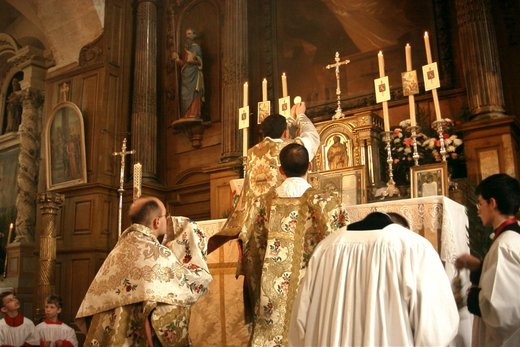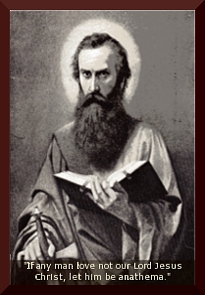The splendor associated with the true worship of God is the inheritance of every Catholic.
The Cenacle in which Our Lord celebrated the first Mass was a beautifully furnished upper chamber. Its mere elevation, designated it for use on special occasions above and beyond mundane activity. Why did our Lord expressly desire that the place for this singular Pasch should be richly adorned? Bossuet provides us with the answer: “The Evangelists do not remark,” says Bossuet, “that this was His ordinary custom on other Pasches. The Holy Fathers also say that this adornment was connected with the Institution of the Eucharist. Jesus Christ desired to show us with what care places consecrated to the celebration of this Mystery should be decorated. It is only in this circumstance that He did not wish to appear poor. “
The Old Testament, with its foreshadowing of “good things yet to come”, is filled with precise directives from God Himself regarding accoutrements, elaborate priestly garments, ritual, ceremony, victims, etc., for how He wanted to be worshiped. If that was the case then, it only follows that the worship of God in the New Testament should be even more magnificent.
be even more magnificent.  “If that which is done away is glorious: much more that which remained is in glory” 2 Cor. III:II. God, over a period of thousands of years before Christ, did not prepare His people for the Perfect Sacrifice so that under the New Covenant, we could then worship Him in a more mediocre and miserly manner than did the Jewish race that only beheld the “shadow”; to do so would only be a deterioration, not a perfection of true worship.
“If that which is done away is glorious: much more that which remained is in glory” 2 Cor. III:II. God, over a period of thousands of years before Christ, did not prepare His people for the Perfect Sacrifice so that under the New Covenant, we could then worship Him in a more mediocre and miserly manner than did the Jewish race that only beheld the “shadow”; to do so would only be a deterioration, not a perfection of true worship.
What is most capable of drawing the hearts of a humanity caught in the drab and dull monotony of day-to-day living with all its uncertainties and sorrows, if not the Mass? This, the greatest glory on earth, is in the hands of the Catholic Church. The ritual, reverence, magnificence in which it must be celebrated is the sign of our belief that Christ is, here and now, present in our world of pain. Isn’t that something we should want to communicate to the world?
 From the Manual of the Holy Catholic Church on the pre-conciliar liturgies of the Church:
From the Manual of the Holy Catholic Church on the pre-conciliar liturgies of the Church:
Q. But are not the religious ceremonies used in the Catholic Church, contrary to the simplicity and humility of the Gospel?
A. No. Because, first, whatever conduces to preserve order and decorum in the worship of God, is not contrary to the humility and simplicity of religion; for our reason teaches us that order ought to be observed in all things, and especially in what regards the service of the Almighty; St. Paul expressly commands, that “all things be done decently and according to order.” 1 Cor. XIV:40 …..Now, all the public ceremonies of the Church are ordained for this end – to preserve uniformity in all the exterior acts of religion. [Forget post-conciliar inculturation!]
Second, Whatever has a connection with virtue is used for no other view but to render us more virtuous and better disposed towards the service of God, and cannot possibly be against the humility and simplicity of religion; for this can never forbid any external action which is performed with an humble and sincere heart in order to honor God. Now, all the ceremonies of religion are intended to excite in our minds a high idea of the magnificence and grandeur of Almighty God, and a just sense of our own weakness and infirmities, and they are used on purpose to give public homage to God, as our sovereign Lord, and to acknowledge our own dependence on Him.
Third, The humility and simplicity of the Gospel consists in a deep sense of the infinite majesty of God, and of our own unworthiness, and in a total submission to Him, seeking His honor and glory, and the accomplishment of His Holy will in all things. Now, experience itself teaches, that nothing contributes more effectively to excite in our souls, a reverential respect of the Divine Majesty, with a sense of our own nothingness in His presence, than those august and solemn ceremonies which the Church uses.
To be continued



